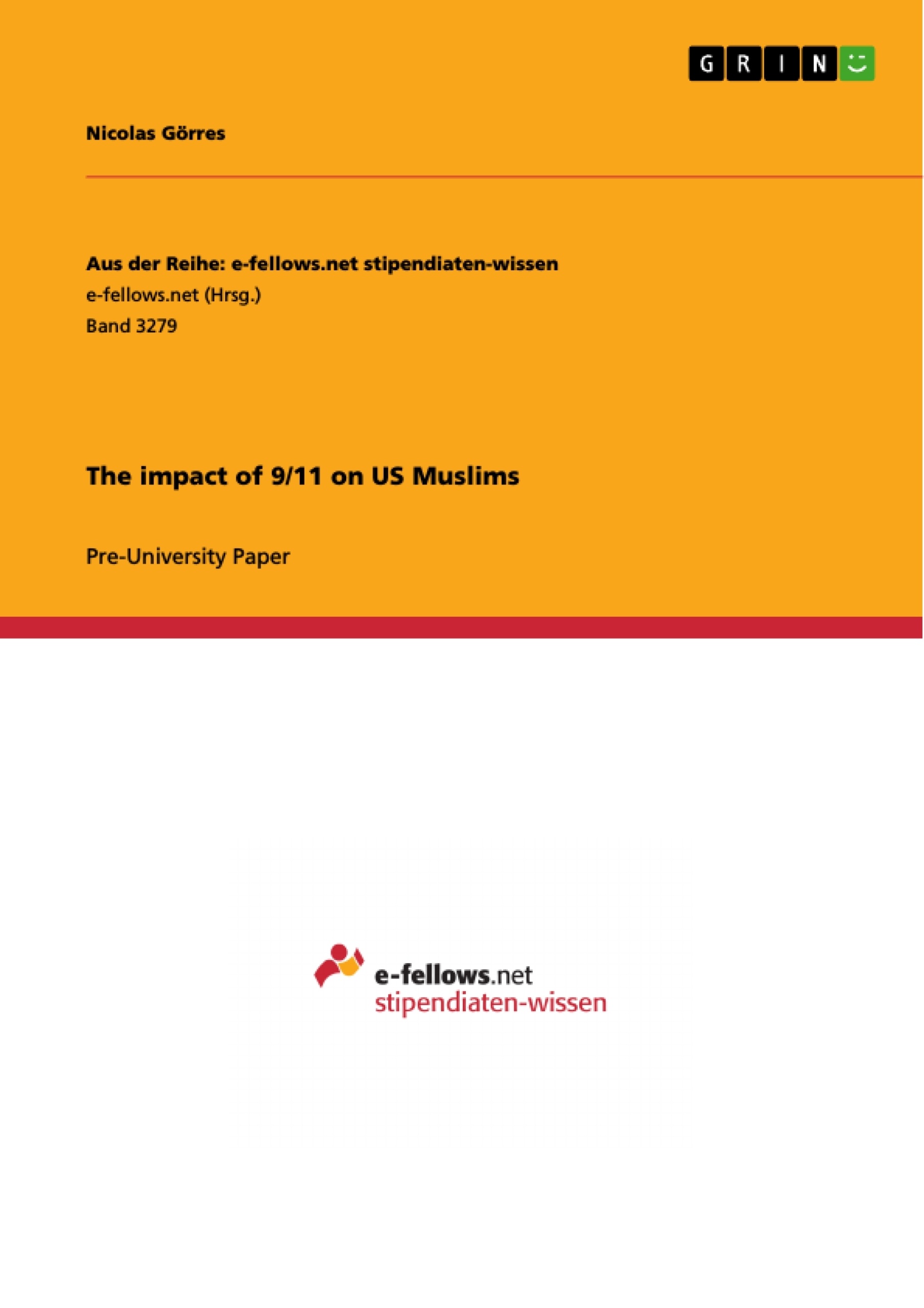First, I will talk about the attacks of September 11th, 2001 because they set the starting point for the changing lives of the Muslims in America. Then, I will reveal the development of Muslims in America, meaning how and why they came to America and how they were treated. Afterwards I will talk about the consequences this day had for the Muslims in America and how they feel about it.
Then I will consider the change of presidency from Obama to Trump and the impact this had on the Muslims. Finally, I will include a survey I made, revealing the different opinions of various people in the United States of America.
Inhaltsverzeichnis (Table of Contents)
- PREFACE
- SEPTEMBER 11TH, 2001
- HISTORY OF U.S. MUSLIMS IN AMERICA
- The beginning of a niche for Muslims in America
- U.S. MUSLIMS AFTER THE ATTACKS
- U.S. Muslims lives in the post-9/11 era?
- What do Muslims think about their lives in America?
- THE IMPACT OF THE CHANGE IN PRESIDENCY FROM OBAMA TO TRUMP
- How did the relations with the Islam change?
- Did laws or restrictions change for U.S.-Muslims?
- HOW MUSLIMS ARE SEEN TODAY
- General Information
- Americans view on Muslims in America
- SUMMARY AND OWN STATEMENT
Zielsetzung und Themenschwerpunkte (Objectives and Key Themes)
The purpose of this research paper is to explore the impact of the September 11th attacks on the lives of U.S. Muslims. It aims to analyze the historical context of Muslim presence in the U.S., the consequences of the attacks on their lives, and the changes in perception and treatment they faced following the events of 9/11. Additionally, the paper will examine the impact of the shift in presidency from Obama to Trump on the relationship between the U.S. government and the Muslim community.
- The history of U.S. Muslims and their integration into American society.
- The immediate and long-term impact of the 9/11 attacks on the lives of U.S. Muslims.
- The changing attitudes and perceptions of Muslims in America post-9/11.
- The influence of different political administrations on the treatment and perception of Muslims in the U.S.
- The ongoing challenges and realities of being Muslim in America.
Zusammenfassung der Kapitel (Chapter Summaries)
The paper begins by discussing the significance of the September 11th attacks and their lasting impact on the global landscape, particularly the Muslim world's perspective on the United States. The chapter then delves into the history of U.S. Muslims, tracing their arrival and integration into American society, emphasizing the challenges and discrimination they faced due to the predominantly Christian nature of the country. It highlights the emergence of the African-American Muslim Nationalist Movement and the positive contributions of individuals like Muhammed Ali in fostering confidence within the Muslim community.
The following chapter explores the consequences of the 9/11 attacks on the lives of U.S. Muslims. It examines the immediate response to the attacks, including fear, prejudice, and discrimination faced by many Muslims. The chapter delves into the experiences of Muslims in the post-9/11 era, shedding light on their daily struggles and anxieties. It also probes the opinions and perspectives of Muslims regarding their lives in America in the aftermath of the attacks.
Schlüsselwörter (Keywords)
The primary keywords and focus topics of this paper include: U.S. Muslims, 9/11 attacks, Islamophobia, discrimination, prejudice, post-9/11 era, integration, American society, political influence, Obama administration, Trump administration, cultural identity, religious freedom, and social justice. The paper explores the complex relationship between these concepts, particularly the impact of the 9/11 attacks on the lives and experiences of Muslims in the United States.
Frequently Asked Questions
How did 9/11 change the lives of Muslims in America?
The attacks led to immediate challenges including increased fear, prejudice, and discrimination. It marked a turning point where the community faced heightened scrutiny and social anxiety.
What is the history of Muslims in the United States?
Muslims have a long history in America, tracing back to the arrival of enslaved people and later immigrants. The paper highlights the emergence of the African-American Muslim Nationalist Movement as a key developmental phase.
How did the presidency change from Obama to Trump affect US Muslims?
The shift in political administrations brought changes in rhetoric and policy. The paper examines how laws and restrictions evolved and how the relationship between the government and the community was impacted.
What is the current perception of Muslims in American society?
While many Muslims contribute positively to society, surveys show a divide in how they are viewed, with ongoing issues of Islamophobia coexisting with efforts toward integration and social justice.
What role did figures like Muhammad Ali play for the community?
Public figures like Muhammad Ali helped foster confidence and a sense of belonging within the Muslim community, challenging negative stereotypes and promoting religious pride.
- Arbeit zitieren
- Nicolas Görres (Autor:in), 2018, The impact of 9/11 on US Muslims, München, GRIN Verlag, https://www.grin.com/document/504436



